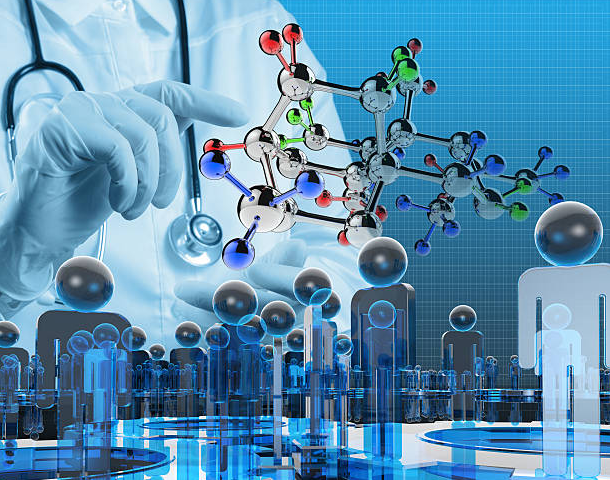Introduction
The field of personalized medicine is revolutionizing healthcare by tailoring treatments to the individual characteristics of each patient. Unlike the traditional “one-size-fits-all” approach, personalized medicine uses genetic, environmental, and lifestyle factors to develop more precise and effective treatments. With advances in genomics, biotechnology, and data science, we are witnessing a shift toward therapies that not only treat diseases more effectively but also minimize side effects.
This article explores the principles of personalized medicine, the types of treatments involved, and how this approach is changing the landscape of conditions like cancer, cardiovascular diseases, and rare genetic disorders.
What is Personalized Medicine?
Personalized medicine, also known as precision medicine, is an innovative approach that involves customizing medical care based on an individual’s unique biological makeup. This includes analyzing a person’s genome, proteins, and metabolism to determine the most effective treatment plan. The goal is to optimize therapeutic efficacy while minimizing the potential for adverse effects.
How Personalized Medicine Works
Personalized medicine combines several cutting-edge technologies:
- Genomic Sequencing
Genomic sequencing allows doctors to map out a patient’s DNA and identify genetic mutations that may influence their susceptibility to diseases or response to treatment. This is particularly useful in oncology, where cancer treatments can be tailored to target specific genetic alterations in tumors. - Biomarker Testing
Biomarkers are measurable indicators of a disease or a patient’s response to treatment. In personalized medicine, biomarkers help in predicting how well a patient will respond to certain medications, ensuring more effective treatment plans. For instance, HER2-positive breast cancer patients may benefit more from targeted therapies like trastuzumab (Herceptin) than traditional chemotherapy. - Pharmacogenomics
Pharmacogenomics studies how a person’s genetic makeup affects their response to drugs. This can guide doctors in selecting the most suitable medication and dosage, reducing the trial-and-error approach often seen in treatments like antidepressants or blood thinners.
Personalized Medicine in Cancer Treatment
One of the most significant applications of personalized medicine is in cancer care. By understanding the genetic profile of a patient’s tumor, doctors can develop targeted therapies that attack cancer cells more effectively, leaving healthy cells relatively untouched.
- Targeted Therapies
Unlike traditional chemotherapy, which affects both healthy and cancerous cells, targeted therapies focus on specific molecules involved in the growth and survival of cancer cells. Drugs like imatinib (Gleevec) for chronic myeloid leukemia (CML) and vemurafenib (Zelboraf) for melanoma are examples of how targeted therapies have transformed cancer treatment. - Immunotherapy
Personalized immunotherapies, such as CAR-T cell therapy, have shown remarkable results in treating certain types of cancer, like leukemia and lymphoma. This therapy involves modifying a patient’s T-cells to better recognize and destroy cancer cells, offering a more personalized and effective approach to treatment. - Liquid Biopsy
Liquid biopsies are a less invasive alternative to traditional tissue biopsies. They detect circulating tumor DNA (ctDNA) in the bloodstream, allowing for earlier detection of cancer recurrence and more personalized treatment adjustments.
Cardiovascular Disease and Personalized Medicine
Cardiovascular disease is another area where personalized medicine is making significant strides. Genetic testing can reveal risk factors for heart disease, allowing for preventive measures or more targeted treatments.
- Cholesterol-Lowering Drugs
Statins are commonly prescribed to lower cholesterol, but not all patients respond equally. Pharmacogenomic testing can identify individuals who may need alternative treatments like PCSK9 inhibitors, which are more effective in certain genetic profiles. - Blood Thinners and Genetic Testing
Warfarin is a widely used anticoagulant, but its effectiveness and safe dosage vary greatly between individuals. Genetic testing for variants in the CYP2C9 and VKORC1 genes can help doctors determine the optimal dose for each patient, reducing the risk of bleeding or clotting complications.
Personalized Medicine for Rare Genetic Disorders
Personalized medicine has been a game-changer for people with rare genetic disorders, offering new hope where there were once limited treatment options. Gene therapies, for example, are designed to correct defective genes that cause these disorders.
- CRISPR and Gene Editing
CRISPR technology has opened up new possibilities in correcting genetic mutations responsible for diseases like sickle cell anemia and cystic fibrosis. By directly editing the DNA of affected cells, CRISPR offers a potentially permanent cure. - Enzyme Replacement Therapies
For conditions like Gaucher disease and Fabry disease, enzyme replacement therapy (ERT) can replace missing or deficient enzymes, reducing symptoms and improving quality of life. Personalized approaches ensure that patients receive the right dose and treatment schedule based on their unique needs.
Challenges and Ethical Considerations
While personalized medicine holds great promise, it also comes with challenges. The cost of genomic testing and targeted therapies can be prohibitive, and there are concerns about data privacy and the ethical use of genetic information. Furthermore, not all diseases have clear genetic markers that can guide treatment, limiting the current application of personalized medicine.
The Future of Personalized Medicine
As technology advances, personalized medicine will continue to evolve. The integration of artificial intelligence and machine learning is expected to further enhance the ability to predict disease risks and treatment responses. The future may hold treatments that are even more finely tuned to an individual’s biological and environmental context, making healthcare more effective and less prone to side effects.
Conclusion
Personalized medicine is transforming healthcare by offering more precise, effective, and safer treatments. Whether in cancer, cardiovascular disease, or rare genetic disorders, this innovative approach is paving the way for a new era of medicine that is tailored to the individual. As research continues, personalized medicine will likely become the standard of care, offering patients more hope and better outcomes than ever before.
References:
- Ginsburg, G. S., & Willard, H. F. (2013). Genomic and Personalized Medicine. Elsevier.
- Khoury, M. J., & Janssens, A. C. J. W. (2014). Pharmacogenomics and Precision Medicine. Springer.
- Chin, L., & Gray, J. W. (2021). Targeted Cancer Therapies and Precision Medicine. Oxford University Press.
- Collins, F. S., & Varmus, H. (2015). A New Initiative on Precision Medicine. The New England Journal of Medicine.
- Topol, E. J. (2019). Deep Medicine: How Artificial Intelligence Can Make Healthcare Human Again. Basic Books.

